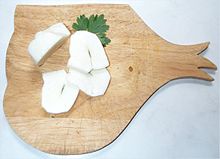Hellim
| Halloumi/Hellim | |
|---|---|
|
Fresh sliced halloumi
|
|
| Country of origin | Cyprus, Levant |
| Region | Cyprus, Greece, Iraq, Jordan, Israel, Lebanon, Palestine, Syria and Turkey |
| Source of milk | Goat, sheep, sometimes cow |
| Pasteurised | Commercially, but not traditionally |
| Texture | Semi-soft |
| Aging time | Commercially not aged Traditionally aged |
| Certification | No |
Halloumi /həˈluːmi/ (Greek: χαλλούμι) or Hellim (Turkish) (from Arabic: حلوم ḥallūm [ħalˈluːm]) is a Cypriot semi-hard, unripened brined cheese made from a mixture of goat's and sheep's milk, and sometimes also cow's milk. It has a high melting point and so can easily be fried or grilled. Halloumi is set with rennet and is unusual in that no acid or acid-producing bacterium is used in its preparation.
Halloumi is popular in the Levant, Greece, and Turkey. Demand in the United Kingdom had surpassed every other European country, except Cyprus, by 2013.
The name "halloumi" is derived from the Egyptian Arabic, itself a loanword from Coptic ϩⲁⲗⲱⲙ halom (Sahidic) and ⲁⲗⲱⲙ alom (Bohairic) 'cheese', referring to a cheese that was eaten in medieval Egypt. In modern Egypt, hâlûmi is similar to Cypriot "halloumi" but is essentially a different cheese, is eaten either fresh or brined and spiced.
...
Wikipedia

